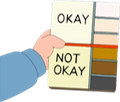Yes yes, language changes over time. I’ve heard that mantra for decades and I know it. That doesn’t mean there aren’t language changes that aren’t grating when they become fashionable (and hopefully temporary).
For me, “morals” being used as a crude catch-all application of “morality,” “ethics,” “integrity” or related concepts bothers me. Sentence example: “Maybe if society had morals there wouldn’t be so many minorities in prison.” 

An even more annoying otherwise-fluent-speaker modification I see is when “conscious” is used to mean “consciousness” and “conscience” interchangeably. Sentence example: “Single mothers on welfare that steal baby formula have no conscious.” It sounds like they’re saying the shoplifter is not mentally aware of their own actions, not that they’re lacking sufficient “morals” to let their baby starve for the sake of Rules-Based Order™.
There’s others, but those two come up enough recently, with sufficient newness, for me to bring them up here. Some old classic language quirks are so established and entrenched that even though I hate them, bringing them up would likely invite some hatemail and maybe some mystery alt accounts also sending hatemail after that. You know, because they “could care less(sic)” about what I think. 
English had a big French spelling phase, so a bunch of our words have entirely different phonetic sounds vs their spelling. I constantly mess this up. Go ahead, make me spell bourgoise or bureacracy the first time. Nope failed again! Conscious/Conscience are definitely in that category.
For me I’m not sure if Math or Maths are correct

Me with a time machine: going back and shooting William the Bastard in the head to save the English language
Use a Kuh-nife when you do it, you bold Kuh-night of Time!

You’re not a real leftist if you can spell bourgeiouiuiouiise on the first try
Burgersee
Boojwah.

First off, amazing username.
Anyway, a tip to spell bourgeoisie that someone here recommended was to sing it to the tune of the Mickey Mouse song. Which, embarrassingly, is the only way I can spell it.
B O U … R G E … O I S I E! Bourgeoisie! Bourgeoisie! Who steals the surplus value from you and me? B O U R G E O I S I E!
And then yeah if you need bourgeois just lop off the final I E
Young people don’t know how to sing the Mickey mouse song
bour-gee-ois-ee is how I remember it
Intellectuals are haram. Ask Gramsci.
“Grey/gray” trips me the fuck up and I’m an English teacher.

I never get that right!

If it’s in Burgerland it’s gray.
If it’s in Jelliedeelland it’s grey.

English had a big French spelling phase
Laughs in William the Conqueror

Fun page: https://en.wikipedia.org/wiki/American_and_British_English_spelling_differences
North Americans contract ‘mathematics’ to ‘math’, most other places shorten it to ‘maths’. I don’t even know if one is more “correct” or if the entire word ‘mathematics’ was a mistake. Honestly, the North Americans might be right about this one.
“Maybe if society had morals there wouldn’t be so many minorities in prison.”
Funny enough, that’s correct, just not in the way the person probably intended. The carceral state and institutional racism are indeed signs of a deeply immoral society.
use the fucking oxford comma you godforsaken cretins
There is almost no scenario in which using the Oxford comma fails to improve sentence clarity.
People are just too lazy to use punctuation for its intended purpose, I guess.
no more half measures walter
both the oxford comma and the lack of an oxford comma can introduce ambiguity in different situations.
both, the, oxford, comma, and, the, lack, of, an, oxford, comma, can, introduce, ambiguity, in, different, situations,.,
Fuck you and the coward’s comma
Fuck you, cowards and commas!
“could care less”
THIS
“it means the same thing!” they say
IF COULD CARE LESS MEANS THE SAME AS COULD NOT CARE LESS THEN THE WORD “NOT” IS ENTIRELY MEANINGLESS
 AAAAAAAAAAAAAAAAAAAAAAAAAAAAAAAAAAAAAAAAAAAAAAAAAAAAAAAAAAAAAAAAAAAAAAAAAAAAAAAAAAAAAAAAAAAAAAAAAAAAAAAAAAAAAAAAAAAAAAAAAAAAAAAAAAAAAAAAAAAAAAAAAAAAAAAAA
AAAAAAAAAAAAAAAAAAAAAAAAAAAAAAAAAAAAAAAAAAAAAAAAAAAAAAAAAAAAAAAAAAAAAAAAAAAAAAAAAAAAAAAAAAAAAAAAAAAAAAAAAAAAAAAAAAAAAAAAAAAAAAAAAAAAAAAAAAAAAAAAAAAAAAAAAThe people that usually say “could care less” tend to “care less” about saying it correctly because apathy is super cool just like based atrocity enjoying stoner drunk science man Rick Sanchez said it was.
The fact 99% of people use the word “logical” to mean “reasonable” because they literally don’t know what logic is.
Logic means you feel very strongly about your opinion and you want to imply that those who disagree with you are illogical.

I am irrationally irritated when people describe something as “addicting” rather than “addictive”. I’m not even sure it’s technically incorrect, and language is a fluid thing so this shouldn’t irritate me. But I still have to consciously tell myself to not be annoyed by it.
In this house the only thing we call addicting is addictinggames.com 😤
deleted by creator
That counts; the quirk doesn’t even necessarily have to be “wrong” to be annoying to an individual.
In my defense I don’t think I’ve ever actually corrected anybody, I just stew inside my own skull
I’ve given up on trying to correct people for the most part because language does change over time and new norms are established whether or not I’m comfortable with them. Sure, some of them are clumsy and staggeringly incorrect (like “conscious” being used in place of “conscience”) but if it’s done enough times, it’ll become the expected way to communicate.

It feels like an Americanism to me. I pretty much only see it on the internet
I think you’re right about that
I really hate the misuse of the word “pretentious.” A lot of people use it to mean something like “pompous” when it’s root is “pretense.” It’s only pretentious if someone is dissembling about how much they know about something. If someone actually knows as much about a subject as the appear to then it doesn’t matter how annoying they are, it’s still not pretentious.
And that’s my very specific pet peeve. And having this opinion is itself extremely annoying, but it’s still not pretentious goddamnit
A pretense doesn’t have to be in relation to knowledge that someone holds. A pretense could be someone acting as if they’re more dignified or esteemed than they are, which is practically the definition of pompous.
I believe everyone should have the right to dignity no matter who they are
As do I, but I’m using ‘more dignified’ in the sense of claiming to have a higher social status.
A bit pretentious eh?
Fun fact, pretentious and pretense are separated by more than 300 years.
I dance that line a fair bit and while I usually mean the correct version, the one involving pretense and implications of some bigger grander something that isn’t actually there, I may have annoyed you in the past by being too fast and loose with how I used it in the past. Sorry!

If you have, I’ve already forgotten and forgiven you
Corpo-speak e-mails from bloviating, self-important middle managers who regurgitate such turns of phrase as “at this time” and/or “in a timely manor [sic]” make my eye twitch. I can overlook a lot of the “synergizing our thought leaders with operational tempo” jargon salad, but the aforementioned phrases trigger my fight-or-flight response, probably because they reek of petty tyrant small business night manager mentality and bring me back to the headspace of dealing with bosses like that when I was a kid.
I also once had to work with an IT project manager who insisted on pronouncing the word “processes” as if it had a long-E vowel sound in the plural (“pro-cess-eez”). It would derail my train of thought every fucking time.
Also also once had a direct supervisor who would throw around “irregardless” almost daily.
AT THE END OF THE DAY
LOOKING AHEAD
ALL HANDS ON DECK
TIGHTEN OUR BELTS

Also also once had a direct supervisor who would throw around “irregardless” almost daily.
I HATE THAT NON-WORD
I HATE THAT NON-WORD
I love using this language sarcastically
It’s a solution with real value!

Bonanza!
When Enlightened Centrists whine about someone having an agenda or a narrative.

Their regime.
Our government.
Their hand-picked successor.
Our vice president.
Their totalitarian authoritarianism.
Our rules-based law and order.
Their suppressed political dissidents receiving brutal crackdowns.
Our protestors rioting without a permit, being shut down by the police.
Their secret police.
Our civilian police officers
“_ and I” hypercorrection, or maybe reanalysis if we’re being more descriptivist.
It’s an interesting subject, and I’m kind of split on it as an amateur linguist, but as an English speaker it sticks out like a sore thumb to me. I think English prescriptivism has pushed the order of pronouns in collective noun/pronoun phrases too much (eg. he and I, not I and him), and people have started to reanalyze the phrase as a noun phrase in itself, but not everyone so it sounds weird to a slice of the population. Then there’s disjunctive pronouns that throws a wrench in the works.
Note: asterisk means it sounds ungrammatical to speakers of the language in linguistics (me in this case), no asterisk means okay to say. Also later correct reformulation means it’s less common but still correct:
Alice, Bob and I are going.
*I are going.
I am going.
Me, Alice, and Bob are going.
*Me are going.
*Me am going.
Want to join me?
*Want to join I?
*Want to join Alice, Bob and I? <– this is the one that annoys me, but you might think it’s fine
Want to join Alice, Bob and me?
Alice and Bob aren’t going probably, but me, I’m going for sure
Alice and Bob aren’t going probably, but I, I’m going for sure
It’s me who is going
It’s me who am going <– this is pushing it
It’s I who is going
It’s I who am going <– actually acceptable, but I still do a double take
Alice and Bob like to go more than me
Alice and Bob like to go more than I
Sometimes I can be tricked into overthinking something that I had taken as an unexamined given until it no longer makes sense to me.
And you just did that to me.

I was interviewed by a linguist about my other native language once and it broke my ability to say stuff in that language for a day or two. It’s only fair I get to do that to an Anglophone too

Fair.

It’s I who am going
:0

Grammer is really quirky and I could literally talk about it for hours. The affect that grammer has on all of us is really something to behold, it really peaks my interest. Some people “go nucular” when talking about grammer but you and I are on the same page I think.

*ours
I hate linguistic prescriptionism and believe all English is fine if people understand what you mean, so things like this just gives me ammo to bother others in the future.
I could care less about conscious vs conscious before, but now that I know it slightly annoys others I’ll never spell it with the e ever again

I know contrarianism is pretty hip so you do you I guess.

deleted by creator
Annoying whiny pedants is good.
What’s your opinion on the movement to reintroduce singular they into public awareness? Do you hate it for being prescriptivist?
Chauncer and Shakespeare use singular they, while the push for gender neutral “he” was much later, in the 1700s and 1800s. So from this view singular they is descriptive of how language has been used for hundreds of years, while arguing that it’s a mistake or wrong would be prescriptive. And this is just anecdotal, but everyone where I live uses singular they (at least for unspecified gender people), even my grandma who uses old words and has heated elder moments.
But even if singular they usage was brand new, I wouldn’t consider advocacy as a form of prescriptivism. Prescriptivism usually comes from places of authority over language, like education and publishing, and states what’s right and wrong to use. I don’t see he-or-she being defined as incorrect by advocates of singular they, just clunky and exclusive. Not so much “this is wrong” as “we can do better than that”. An appeal for niceness and understanding, rather than an accusation of improper language.
People stop using words and phrases all the time, both intentionally or just picked up from their environment. Some words become offensive and others become disused, leading to them falling out of favor, and new words are coined all the time, sometimes as direct replacements. Just the inevitable evolution of language.
Wikipedia does state that it may include politically correct language under the label, but I don’t normally see that used in linguistic discussions in my experience. I would be hesitant to include that under it, since it seems to kinda stretch the definition to the point of not-super-usefulness where asking someone to stop saying slurs or correcting your name could be seen as prescriptivism. But of course, language is determined by its speakers, so if you would include those under it go ahead.
Sorry that was pretty rambly, but basically I don’t think its prescriptivist to ask someone to change their language to not hurt others.
Ia, a akry
People using “reactionary” instead of “reactive”
and when you actually use “reactionary” correctly they think you mean reactive
Using “whilst” where “while” would work fine. Feels like the grammatical equivalent of plastic cutlery spray-painted chrome
It sounds smarter, cromulently.

 I’m just like a fancy British guy fr
I’m just like a fancy British guy frThat means they can say the c–t word because it’s just chummy friendly slang even when they’re using it to talk about feeeeeeemales that enrage them like Anita Sarkeesian!

Still weird to me how British people would use “whilst,” but don’t use “gotten.” I suppose they would feel the same for USians since “gotten” was already considered old-fashioned before being picked up by USians again.
run the gambit
when they mean
run the gamut
Maybe it’s because I’ve been familiar with color gamut since like Photoshop 5 or something. And I know people that really likely know the gamut word but they just got the telephone version of the phrase at some point I guess.
There’s quite a few of the ‘telephoned’ phrases, and it really grates on me. I don’t normally interject though. Just a personal annoyance.
IF WE DONT CAPTURE THE TURRENT THEN WE LOOSE

There’s the saying about how if someone mispronounces a word, it likely means they learned it by reading.
So I try not to get too uptight about this stuff. I remember when I first read ‘clandestine’ and my brain just assigned it ‘candle-stine’ as the pronunciation. And then there’s just tons of accepted variations on some words as well.But ya, I think FF7 contributed significantly to ‘run the gambit’ becoming so common in use.
I admit I find “Rickyisms” funny. They get two birds stoned at once, though I doubt Ricky learned them from reading.
Water under the fridge
Two turnips in heat
Atoadaso
I know what the fuck a jah-lap-a-no is.
Let’s be friends with the Benedicts.
 “Shit clock’s ticking, UlyssesT. We’re watching you. Like a shithawk.”
“Shit clock’s ticking, UlyssesT. We’re watching you. Like a shithawk.”Oh Mr Lahey, not another night of the shit abyss…
Yeah making fun of people for mispronouncing words is silly because you are just making fun of someone for reading more than people around them.
That’s me! Read way more than I talked and so sounded very strange trying to say the new words I learned
I pronounced the “b” in subtle for years as a kid. Still looks like subtell to me
Putting random 'n’s and 'k’s in words comes up























